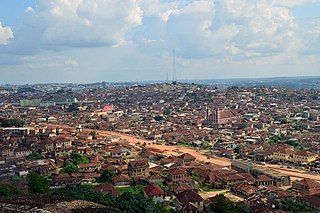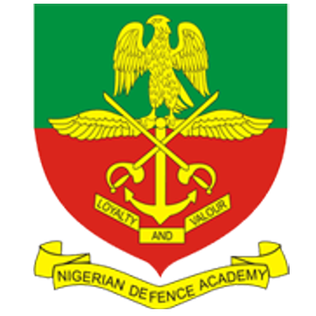
The Nigerian Armed Forces (NAF) are the military forces of Nigeria. The armed forces consist of three service branches: the Nigerian Army, Nigerian Navy, and Nigerian Air Force. The President of Nigeria functions as the commander-in-chief of the armed forces, exercising his constitutional authority through the Ministry of Defence, which is responsible for the management of the military and its personnel. The operational head of the AFN is the Chief of Defence Staff, who is subordinate to the Nigerian Defence Minister. With a force of more than 230,000 active personnel, the Nigerian military is one of the largest uniformed combat services in Africa. According to Global Firepower, the Nigerian Armed Forces are the fourth-most powerful military in Africa, and ranked 35th on its list, internationally.

Ibrahim Badamasi Babangida is a Nigerian retired general and statesman who served as military president of Nigeria from 1985 until his resignation in 1993. He rose through the ranks to serve from 1984 to 1985 as Chief of Army Staff, going on to orchestrate his seizure of power in a coup d'état against Muhammadu Buhari.

Ogun State is a state in southwestern Nigeria. As a Nigerian state, Ogun is the second most industrialised state after Lagos, with a focus on metal processing. It has good road and rail connections to the harbours in Lagos and Lekki. Wole Soyinka, winner of the Nobel Prize for Literature 1986, lives in Ogun.
Raji Alagbe Rasaki is a retired brigadier general in the Nigerian Army who served as military governor of Ogun State, Ondo State, and Lagos State between 1986 and 1991 during the military administration of General Ibrahim Babangida.

Owoye Andrew AzaziGSS DSS MSS CMH was a Nigerian army general who served as National Security Adviser to President Goodluck Jonathan, was Chief of Defence Staff (CDS) of Nigeria, and Chief of Army Staff (COAS). Before his first service chief appointment (COAS), he was General Officer Commanding (GOC) 1 Division, Kaduna State.
Domkat Yah Bali was a Nigerian army four-star general, who was Minister of Defence and Chief of Defence Staff from 1984 to 1990, and a member of the Supreme Military Council of 1984–1985, and the Armed Forces Ruling Council of 1985–1990.
Donaldson Oladipo Oyeyinka Diya, ; 3 April 1944 – 26 March 2023) was a Nigerian general and lawyer who served as Chief of General Staff under military head of state General Sani Abacha from 1994 until his arrest for treason in 1997. He also served as Chief of Defence Staff and as military governor of Ogun State from January 1984 to August 1985.

The Nigerian Defence Academy (NDA) is a military university based in Kaduna, Nigeria that trains officer cadets for commissioning into one of the three services of the Nigerian Armed Forces: the Army, the Navy, and the Air Force. The duration of training at the Nigerian Defence Academy is five years.
This article is about the particular significance of the year 1993 to Nigeria and its people.

The Nigerian Army (NA) is the land force of the Nigerian Armed Forces. Tracing its history to British colonial forces in West Africa, it is the largest component of the armed forces. The President of Nigeria is the Commander-in-Chief of the Nigerian Army, and its professional head is the Chief of Army Staff, who is the highest ranking military officer of the Nigerian Army. It is governed by the Nigerian Army Council (NAC). The Nigerian Army is operationally and geographically divided into ten divisions, the basic field formation. The army has been involved in operations throughout the country, most especially during the Nigerian Civil War, and has undertaken major operations abroad. Nigerian Army officers have served as chiefs of defence in other countries, with Brigadier General Maxwell Khobe serving as Sierra Leone chief of staff in 1998–1999, and Nigerian officers acting as Command Officer-in-Charge of the Armed Forces of Liberia from at least 2007.

The Nigeria Police Force is the principal law enforcement and the lead security agency in Nigeria. Designated by the 1999 constitution as the national police of Nigeria with exclusive jurisdiction throughout the country, as at 2016 it has a staff strength of about 371,800. There are currently plans to increase the force to 650,000, adding 280,000 new recruits to the existing 370,000. The Nigeria Police Force is a very large organisation consisting of 36 State commands and Federal Capital Territory (FCT) grouped into 17 zones and 8 administrative organs. The agency is currently headed by IGP Kayode Egbetokun. In 2020, it underwent major overhauls.
Mohammed Buba Marwa, is a retired Nigerian army brigadier general, who is serving as the Chairman of the National Drug Law Enforcement Agency (NDLEA) since January 2021. He previously served as governor of Lagos State from 1996 to 1999 during the military regime of General Sani Abacha and Abdulsalami Abubakar and governor of Borno State from 1990 to 1992 during the military regime of General Ibrahim Babangida.
Ganiyu Olarenwaju Solomon is a Nigerian politician. He was senator for the Lagos West constituency from 5 June 2007 to 6 June 2015. He is a member of the Action Congress (AC), now All Progressives Congress (APC). He is a former president of the Rotary Club of Isolo

Hamza Al-Mustapha is a retired Nigerian Army major, intelligence officer and politician who served as Chief Security Officer to Head of State General Sani Abacha from 1993 until his death on 8 June 1998.
The word Oga is a Nigerian Pidgin gotten from the Igbo word ogaranya which means "influencial senior or boss." The phrase My Oga at the top may be used to show respect to someone in a position of authority.

The Western Nigeria Security Network (WNSN), codenamed Operation Amotekun (Yoruba for "Leopard" or "Cheetah") and simply known as the Amotekun, is a security outfit based in all the six states of the South Western, Nigeria, responsible for curbing insecurity in the region. It was founded on 9 January 2020 in Ibadan, Oyo State, Nigeria as the first regional security outfit initiated by a geopolitical zone in Nigeria.
The following is a list of events in 2020 in Nigeria.
Abubakar Sadiq Liman is a military officer in the Nigerian Air force. In November 2019, he was appointed commandant of Armed Forces Command and Staff College, Jaji to March 2021. He is presently appointed as the Deputy chief of Defence Intelligence Agency (Nigeria) (DIA).
The 2015 Ogun State gubernatorial election occurred on 11 April 2015. Incumbent Governor APC's Ibikunle Amosun won election for a second term, defeating PDP's Adegboyega Isiaka and several minor party candidates. Amosun received 60.38% of the vote.

The federal government of Nigeria has initially responded to the COVID-19 pandemic in the country with preventive measures to curb the spread of the coronavirus disease 2019 in the country.





























